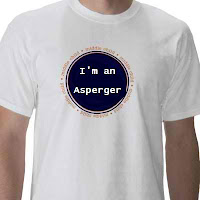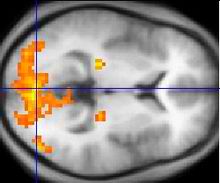Many parents who have struggled with a child for several years feel a sense of relief when their child gets a “diagnosis.” The parent may say things like, “It was such a weight off my shoulders to finally understand why my child behaved the way he did. I thought it was my parenting, but now I see it was his disorder instead.”
Many adults who have had emotional problems and/or social difficulties over the years find it comforting to one day discover, “Oh, I have Aspergers! No wonder I haven’t been able to hold a job or find a girlfriend/boyfriend.”
Unfortunately (or fortunately as the case may be), finding solace in having a “disability” or “disorder” comes with a price – a much bigger price than most realize they have paid.
1. All ‘unwanted’ diagnostic features can be helped with therapy.
True, there are some potentially problematic cognitive and behavioral patterns associated with Aspergers that come with the “Aspergers-package” (e.g., insistence on routine, narrow range of interest, etc.). However, most – if not all – “problems” associated with Aspergers can be helped with therapy (e.g., social skills training for those who lack such skills, Cognitive-Behavior Therapy for those who suffer with Aspergers-related anxiety, etc.).
2. A self-fulfilling prophecy will manifest itself – either positively or negatively – when it comes to labels.
When one “buys in” to a label (e.g., Aspergers), the labeled individual begins to view her “self” in a different light. She “reframes” her identity such that her “diagnosis” becomes a part of who she is. The reframe, in and of itself, doesn’t come with any serious ramifications. However, with the new reframe comes a different way of thinking about “self” and others. This cognitive change results in a different way of feeling about “self” and others, which in turn results in a different way of behaving (or conducting one’s life). In other words, she begins to “live up to” her diagnosis, displaying more and more of the symptoms that are in alignment with the diagnostic features of her “disorder.” This is a self-fulfilling prophecy working toward “disability” rather than ability.
Conversely, many parents of Aspergers children who have sought counseling have been advised (by therapists who have experience with the Aspergers condition) to “reframe” Aspergers in a positive light, thus setting-up a self-fulfilling prophecy that works toward “ability” rather than disability. For example, when disclosing to her child that “there is this thing called Aspergers,” the parent may be instructed to do the following:
Lead with strengths. All children with Aspergers have significant areas of strength (even if this has not been translatable into tangible success yet). Bring up areas of strength with the child who is suspected of having Aspergers. Next, tactfully point out the areas in which he is struggling. Then, suggest to him that “there is this thing called Aspergers,” which is a confusing combination of strengths and challenges.
Think like a counseling psychologist for just a moment…
Words are important. Words change the way you think, feel and behave. Notice in the “reframes” above that there was never any mention of a “disability” or “disorder.” Also notice the statement “there is this thing called Aspergers.” This statement separates the ‘label’ from the ‘child’. Your child is not “an Asperger” – he is a “human being” who has a certain set of strengths and challenges.
In reframing, Aspergers is thought of as a “condition” replete with possibilities, strengths, and challenges that are able to be addressed sufficiently. In this state of mind, the child tends to view his “self” as “able” (and maybe even better off than the general population). With this mindset, the child – as an adult – may very well “set the world on fire” with his area of expertise (e.g., engineering, computer programming, etc.).
3. Labels tend to help the individual relinquish a level of responsibility.
If I receive the label of Aspergers, I can say to myself and others, “See, this is why I can’t - or don’t - do certain things. It’s not my fault – it’s my disability.” When others are in agreement that I am “not able,” I am free from meeting certain expectations from parents, teachers, employees, etc. I can safely lower my standards, settling for the “comfort zone” that comes with the assistance (or over-assistance) from others.
I have counseled hundreds of families who, for example, have a 26-year-old adult child with Aspergers who is still living at home playing video games all day. Why? The entire family “bought into” the “disability reframe” years ago. As a result, the child (now an adult) behaves in accordance with his label, even though - WITH THERAPY - this Aspie could be employed, happily married, and living in his own home.
Does all this mean we shouldn’t have any labels? Of course not! Without labels, we wouldn’t be able to conceptualize ‘clusters of characteristics’ (a set of symptoms that defines a particular mental/emotional/behavioral state). However, it is important to “reframe” the label as an ‘opportunity’ to ‘capitalize on strengths’ and ‘work on the areas that present challenges’. This use or words is empowering rather than debilitating, ability-based rather than disability-based, all of which helps the labeled individual to be all that he/she can be rather than settling for a life of mediocrity – or worse yet – hopelessness.
For those who want to hold onto the label “disability” – you should know exactly what you are settling for. As define by Wikipedia: “A disability is an umbrella term, covering impairments, activity limitations, and participation restrictions.”
Notice the ‘words’ above: impairments, limitations, restrictions.
Warning: Be careful about the words you use to describe your condition. Your words become your reality!
We polled a group of Aspergers teens and asked the question: Is Aspergers a “disability” or just a “difference”? Here are some of the initial responses:
I think it's only a disability because the world is not suited for us. Consider: What if all humans were born with crippled legs? We would all be on wheelchairs, and there would be no stairs, so what if a small portion of a population were born with functioning legs - they would have to adapt to a world not meant for legs but for wheels, no stairs, just ramps, they would obviously have some trouble with a lot of this, these fully functioning individuals are disabled, but only in the same way all humans are disabled and handicapped and an atmosphere without air, it doesn't mean there’s something inherently wrong with them. I certainly can't think of any of my issues that couldn't be solved by simply being an in more AS friendly world, no more bright lights and loud noises or eye contact.
~~~~~~~~~~~~~~~~~~~~~~~~~
My version is just a difference. I am high functioning despite my issues and am not "disabled" in any part of my life that matters to me.
~~~~~~~~~~~~~~~~~~~~~~~~~
Maybe - like being tall? Standing alone, being tall is just a deviation, and therefore a difference from the average. You could even have a population of tall-only people in which they wouldn't stick out. However, being tall in a society of people who are shorter or even considerably shorter than you have a high potential of leading to problems, maybe even to the extent of being a disability. So, maybe like 'being tall' but perhaps in two or three different ways and the problems these features cause to the individual may augment each other.
~~~~~~~~~~~~~~~~~~~~~~~~~
Difference, I'm glad that I'm not NT. I would kill myself if I had to be one of those "gangster" people who have sex all day, get bad grades and graffiti everything in sight like they do. I like the way I am even if it is difficult to live with.
~~~~~~~~~~~~~~~~~~~~~~~~~
A difference for me (but I'm very high functioning Aspie): I can do what other people do but with more effort, but NT can't do what I do, so... I win.
~~~~~~~~~~~~~~~~~~~~~~~~~
I continually find myself disagreeing with people on this, often labeling us because of their own situations.... i.e... when children often have an associated condition with autism which courses a disability, they insist autism is the disability. I feel a more general positive use of how we are all described is vital to help phase out the old stereo type of what autism often is seen as by many.... as most of us know here those of us on the autism spectrum are as diverse and different as those that are not. The word disorder is often used and some are starting to use the word condition, my preference is still difference, as feel until our differences are fully understood, accepted and allowed, many will continue to feel they have a right to want us to conform to a stereo type imagine to suit them, not necessarily us!
~~~~~~~~~~~~~~~~~~~~~~~~~~
I think it's a condition with both disabilities and things that are mere differences. So I think it can be misleading to say that it's all mere disability.
~~~~~~~~~~~~~~~~~~~~~~~~~
I have no problem with the word disability, but unfortunately it tends to stereo type us even more than others already do, and gives a false misconception to many that we are all disabled, when many of us are not, many function extremely well, it’s just often as I see it anyway our difference so misunderstood.
~~~~~~~~~~~~~~~~~~~~~~~~~
To me it’s nothing. I don't want anyone to know about my Aspergers and I don't want to be referred to by it at all.
~~~~~~~~~~~~~~~~~~~~~~~~~
For some reason the people I talk to genuinely stumble over the "right" politically correct word. In that case, I'll accept just about any word they use because I know they're trying to courteous...
~~~~~~~~~~~~~~~~~~~~~~~~~
It’s always seems to be the D "disease", "disability", "disorder", "disadvantaged" my "D" has to be different, we are simply different and feel it’s about time people focus on how able we are, as everyone has strengths and weakness, and can all be able or disabled in many ways... ignorance disables other not on the spectrum seeing what able individuals we really are, after all some of the best minds on the planet are on the autism spectrum, but guess while there continues to be no fact we are mysteries as the universe to some.
~~~~~~~~~~~~~~~~~~~~~~~~~
I think that it's a difference, and what can be different can be beautiful.
~~~~~~~~~~~~~~~~~~~~~~~~~
As I see it, difference (neurodiversity) is more descriptive, while disability is more relational. In other words, disability can be socially defined as a lack of enablement by those in power.
~~~~~~~~~~~~~~~~~~~~~~~~~
I can't help being irritated sometimes by the constant identity construction work done by people who identify with the Aspergers label. Whatever they think, or say or do, they always, always view it through the prism of AS. It is also clear that many carefully adjust their behavior to fit the predictions of the diagnosis. It is as if the diagnosis had become a full time job for them.
~~~~~~~~~~~~~~~~~~~~~~~~~
I can't help being irritated sometimes by the constant identity construction work done by people who identify with the Aspergers label. Whatever they think, or say or do, they always, always view it through the prism of AS. It is also clear that many carefully adjust their behavior to fit the predictions of the diagnosis. It is as if the diagnosis had become a full time job for them.
Resources for parents of children and teens with High-Functioning Autism and Asperger's:
==> How To Prevent Meltdowns and Tantrums In Children With High-Functioning Autism and Asperger's
==> Parenting System that Significantly Reduces Defiant Behavior in Teens with Aspergers and High-Functioning Autism
==> Launching Adult Children with Asperger's and High-Functioning Autism: Guide for Parents Who Want to Promote Self-Reliance
==> Teaching Social Skills and Emotion Management to Children and Teens with Asperger's and High-Functioning Autism
==> Parenting Children and Teens with High-Functioning Autism: Comprehensive Handbook
==> Unraveling The Mystery Behind Asperger's and High-Functioning Autism: Audio Book
==> Highly Effective Research-Based Parenting Strategies for Children with Asperger's and High-Functioning Autism






